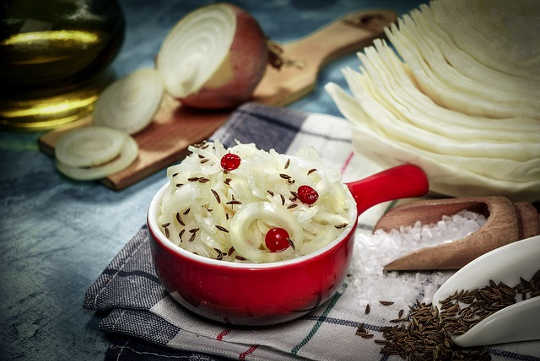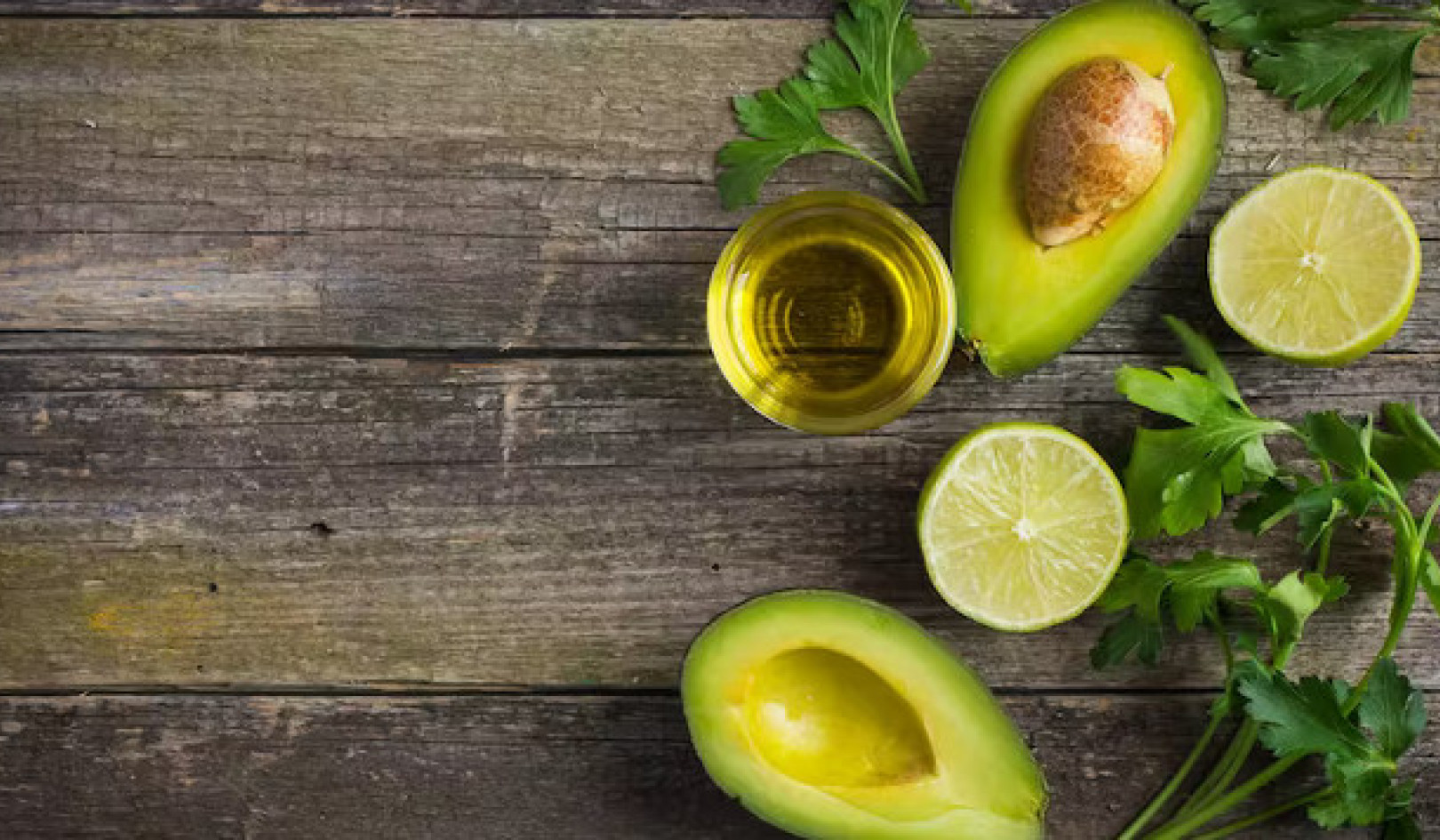
I am passionate about fermented foods. I love making them, eating them, and inventing new ones. My kitchen routinely bustles with microbial activity and new cultured creations. I’ve even reserved one counter as a fermentation station.
Almost daily we eat at least one kind of fermented food, from sauerkraut to cheesecake and ice cream (yes, cheesecake and ice cream, which are among my favorite fermented food innovations!). Just ask my husband, Curtis, who enjoys my sauerkraut so much I’ve nicknamed him Krautis. He often comments that we share our kitchen (and sometimes our living room and dining room too, if I can’t ifnd kitchen space for my crocks!) with millions of microbes working their magic. He doesn’t mind, though, because he knows that our little microbe community results in a wide variety of delicious and health-building food that we both enjoy.
You Can Do It!
You can take everyday foods and transform them into delicious superfoods at home in your kitchen with minimal effort and almost no money! It’s true! Simply by fermenting vegetables, nuts, beans, and other foods into sauerkraut, yogurt, kimchi, and more, you significantly multiply their health-building properties. Everyday foods like yogurt and sauerkraut are just the beginning of what is possible.
No matter how delicious these cultured creations may taste, the reality is that there is far more to eating fermented foods than their great taste — there are also some incredible health benefits. And while most people are familiar with the gut-boosting properties of these cultured creations, their healing properties go well beyond the gut.
Some of these health benefits include cancer prevention and healing, diabetes reduction, and a boost in immunity against many other diseases. Research shows that some fermented foods like kimchi and sauerkraut may even help in the fight against superbugs — those virulent strains of bacteria, viruses, and fungi that have become stronger and are now resistant to most of our medicines — when our best antibiotics fail!
I’m certainly not claiming that fermented foods are cures for whatever ails you, but I would be remiss if I didn’t mention some of the exciting research that shows the tremendous potential of fermented foods and the many probiotics they contain. Although probiotics are often touted as “beneficial bacteria,” that is technically an incomplete description.
It is true that many beneficial bacteria are considered probiotics, but that is only part of the story: probiotics can also include other types of beneficial microbes like yeasts. Probiotics are any of the vast number and variety of living microorganisms that bestow health benefits when ingested in food (or taken in supplement form, if you choose to do so).
When I mention beneficial yeasts, people immediately assume that all yeasts cause yeast infections. But they don’t — probiotic yeasts do not cause infections. Actually, more and more research shows that probiotic yeasts may help your body address harmful yeast infections.
A Variety of Live Cultures
I also frequently hear people who consider themselves “in the know” tell me, “I get all the probiotics I need from eating yogurt every day,” or something to that effect. They claim they don’t need any other fermented foods in their diet. Although a good-quality yogurt that contains live cultures certainly confers some health benefits, in reality yogurt is not enough on its own because it typically contains only a few of strains of probiotics, and some types of commercially available yogurt don’t contain any live cultures at all.
Even if you eat a high-quality yogurt with live cultures every day, you will benefit from getting a wider variety of probiotic strains in your diet. Our bodies naturally need many different strains of probiotics to help us maintain our health. Getting a couple of strains from yogurt is a good first step to restoring the beneficial microbes in the body, but it is just a first step. Eating a wide variety of probiotics from a range of fermented foods can assist you on your quest for great health.
It really doesn’t matter whether you’re trying to prevent or fight diseases like diabetes and cancer or simply trying to maintain great health. Regardless of your health goals, fermented foods can likely help, at least to some degree. That’s because a growing body of exciting research shows that these foods and the beneficial probiotics they contain boost your immune system, increase your energy, and even prevent and heal many diseases, including Alzheimer’s disease and other brain diseases, anxiety, cancer, depression, and heart disease, to name just a few. It’s no surprise that fermented foods are the hottest topic in the field of health right now.
What Is a Microbiome?
Most of us consider ourselves to be individuals, not ecosystems, but we are so much more than just “us.” Since the beginning of the Human Microbiome Project (HMP) — the microbial equivalent of cataloguing DNA in the Human Genome Project — researchers discovered that each human being is actually a vast ecosystem that is home to whole communities of microorganisms. That’s basically what scientists refer to when they talk about our microbiome — the various microorganisms that live in our mouth and nose and on our hands, wrists, knees, and so on.
Every part of our body actually hosts a collection of microorganisms. So far the HMP has discovered that, like our fingerprints, no two microbiomes are exactly the same — yours is different from mine. Even your left hand differs from your right hand, and the fronts of your hands differ from the backs of your hands. At this point the cataloguing of the various bacteria continues. The trillions of bacteria inhabiting our bodies are a product of our life experience and are unique to each of us. Obviously, we are much more than just bacterial compilations, but the microbiome is an added dimension that few of us know about ourselves.
What Takes Place In The Gut, Does Not Stay In The Gut
While the researchers are cataloguing the bacteria in multiple places on our bodies, the gut has been the focal point of their research, for good reason: what happens in your gut plays a significant role in determining the health of your whole body because your gut plays a critical role in the health of your brain, immune system, joints, respiratory system, skin, and much more. There are more microbes in your digestive tract than there are cells in your entire body.
It may sound creepy to think of the bacteria with whom you share your body, but you actually depend on most of them for your life. You literally could not live without many of these bacteria. Instead of being “creeped out” by them, feel grateful for the work they do to keep you healthy and alive. But it also means you need to pay greater attention to your gut health if you want to live a healthy, vibrant life.
Normally our gut has plentiful amounts of beneficial microbes along with some harmful ones we may have encountered along the way. Most of the time the beneficial microbes keep the harmful ones in check, but sometimes our dietary and lifestyle choices can wreak havoc on our gut health. Here are some of the main culprits that throw off our microbial balance.
Twenty Things That Throw Off the Microbial Balance in Our Gut
There are many factors that throw off the delicate microbial balance in our intestines. Here are the top twenty:
- alcohol consumption
- antacid use
- antibiotic use
- birth control pills
- blood sugar imbalances
- chlorinated water
- consumption of antibiotic- and synthetic-hormone-containing foods
- diabetes
- excessive sugar intake
- hypothyroid function
- immune-suppressing drugs
- inadequate hydrochloric acid production
- mercury amalgam dental fillings
- multiple sexual partners or sex with an affected person
- nutritional deficiencies
- poor diet
- recreational drug use
- stress, particularly chronic stress
- toxic exposures
- weakened immunity
How to Heal Your Gut after Antibiotic Use
If you’ve ever taken a course of antibiotics, then you’re probably familiar with some of the side effects of these drugs, including gastrointestinal distress, overgrowth of harmful bacteria in the intestines, and the resulting diarrhea. For many people the aftermath of taking antibiotics is as bad as the health problems that led them to take antibiotics in the first place.
That’s because antibiotics indiscriminately kill bacteria in the intestines — good and bad. This is why so many people suffer from diarrhea while taking these drugs. The first step in healing your body after antibiotic use is to restore a healthy microbial balance. Antibiotics, although frequently helpful in killing harmful bacterial infections, also sway the overall gut bacterial balance by killing beneficial microbes. To help restore the microbial balance you’ll want to increase the diversity of beneficial bacteria as well the numbers of specific probiotics.
The best way to improve the diversity of beneficial bacteria is to eat more fermented foods. Sorry, yogurt lovers: although yogurt can help boost the overall numbers of beneficial bacteria, it isn’t great at improving the diversity of microbes, as it usually has only two to three strains of probiotics, if it contains live cultures at all. If you choose yogurt, avoid sweetened varieties because the sugar will also feed the harmful bacteria that are already overgrown. The best way to avoid excess amounts of sugar as well as ensure the viability of the probiotics in your yogurt is to make your own.
Some of the best fermented foods to boost bacterial diversity in your gut include kimchi, sauerkraut (not pasteurized varieties — choose types with live cultures in the refrigerator section of your local health food or grocery store), pickles (not the kind made with vinegar — choose naturally fermented options), and kombucha. Try to eat a small but increasing amount of fermented foods every day.
You may also benefit from a probiotic supplement, preferably one that contains strains of probiotics that have research-proven benefits against antibiotic-related symptoms, including L. acidophilus, L. casei, L. plantarum, L. bulgaricus, L. reuteri, and S. thermophilus.
Research published in the World Journal of Gastroenterology also shows that the higher the dose of probiotics, the lower the incidence and duration of antibiotic-related symptoms like diarrhea. Ideally it is best to take probiotic supplements and fermented foods prior to or at the start of a course of antibiotics, but if you are already taking antibiotics or still suffering from their effects even though you’re no longer taking them, it is still a good idea to get started on probiotic-rich fermented foods.
Although diarrhea during or after antibiotic use may not seem like a big deal, it demonstrates the rampant destruction of important intestinal bacteria, which can set the stage for other health conditions. A growing number of health conditions, ranging from allergies to arthritis, have been linked to gut health, so restoring the integrity of the gut and its beneficial bacteria colonies and diversities is essential.
Boost Your Microbiome for Better Health
There are many ways to give your microbiome a boost, which in turn promises better health in the long term. Here are some simple things you can do to boost the health of your microbiome:
Eat probiotic-rich fermented foods daily, including kimchi, sauerkraut, and yogurt, to name a few.
Eat a plant-based diet. That doesn’t mean you need to give up meat entirely (unless, of course, you want to), but it does mean prioritizing plant-based foods in your diet, including vegetables, fruit, nuts, grains, beans, and seeds.
Reduce your sugar consumption. Harmful bacteria and yeasts feed on sugar and can quickly throw off the good-to-harmful balance of microbes in your gut.
Drink more water. Water is needed to ensure regular bowel movements and bowel health.
Eat plenty of high-fiber foods like legumes (chickpeas, pinto beans, kidney beans, black beans, etc.), seeds (flax, chia, hemp, sunflower, sesame, pumpkin, etc.), and whole grains (brown rice, millet, amaranth, or quinoa — look for sustainably grown, fair-trade options). Fiber helps keep the bowels moving and prevents stagnation.
If you’re concerned about boosting your dietary intake of prebiotics like inulin and FOS, the following are among the best sources of prebiotics you’ll discover in The Cultured Cook and its recipes:
Fruits: apples, bananas, grapefruit, nectarines, peaches, pomegranate, and watermelon
Vegetables: asparagus, beets, cabbage, endive, fennel, garlic, Jerusalem artichokes, leeks, onions, peas, radicchio, shallots, snow peas
Legumes, nuts, and grains: black beans, cashews, chickpeas (garbanzo beans), kidney beans, lentils, oatmeal, oats, pinto beans, pistachios, soy milk, soybeans, tofu, and white beans
Incorporating more of these foods in your diet will significantly boost your number of health-boosting probiotics too.
Copyright ©2017 by Michelle Schoffro Cook.
Reprinted with permission from New World Library
www.newworldlibrary.com.
Article Source
The Cultured Cook: Delicious Fermented Foods with Probiotics to Knock Out Inflammation, Boost Gut Health, Lose Weight & Extend Your Life
by Michelle Schoffro Cook PhD DNM
 Detailing everything you need to begin fermenting in your home kitchen, The Cultured Cook offers recipes and tips for making vegan, gluten-free foods even better for you. From delicious plant-based yogurt and cheese, to basics such as sauerkraut, pickles, and kombucha, to tempting desserts — even ice cream! — you’ll discover ways to add fermented foods to every meal. Your body will enjoy the benefits of probiotics, as well as the increasingly recognized prebiotics, to supercharge your health.
Detailing everything you need to begin fermenting in your home kitchen, The Cultured Cook offers recipes and tips for making vegan, gluten-free foods even better for you. From delicious plant-based yogurt and cheese, to basics such as sauerkraut, pickles, and kombucha, to tempting desserts — even ice cream! — you’ll discover ways to add fermented foods to every meal. Your body will enjoy the benefits of probiotics, as well as the increasingly recognized prebiotics, to supercharge your health.
About the Author
 Michelle Schoffro Cook is an internationally bestselling author whose works include The Cultured Cook and Be Your Own Herbalist. She is a certified herbalist, a board-certified doctor of natural medicine, and one of the world’s most popular natural health bloggers. She holds advanced degrees in health, nutrition, orthomolecular nutrition, and acupuncture. She lives near Vancouver, BC. Visit her online at www.drmichellecook.com.
Michelle Schoffro Cook is an internationally bestselling author whose works include The Cultured Cook and Be Your Own Herbalist. She is a certified herbalist, a board-certified doctor of natural medicine, and one of the world’s most popular natural health bloggers. She holds advanced degrees in health, nutrition, orthomolecular nutrition, and acupuncture. She lives near Vancouver, BC. Visit her online at www.drmichellecook.com.
Related Books
at InnerSelf Market and Amazon


























